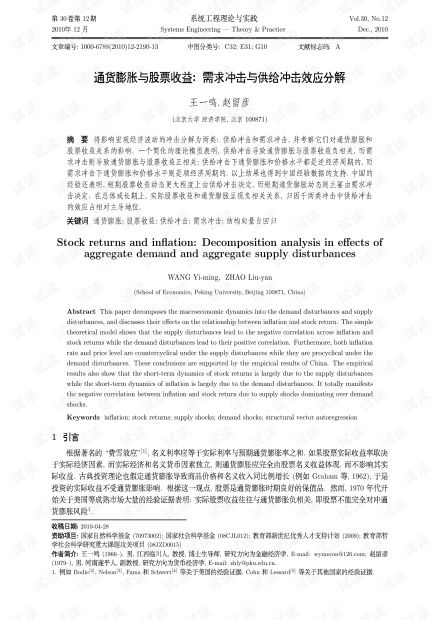This paper aims to provide a comprehensive overview of stock market research, covering various aspects including fundamental analysis, technical analysis, behavioral finance, and quantitative methods. By synthesizing existing literature and empirical evidence, this paper offers insights into the methodologies, challenges, and future directions of stock market research.
Stock market research plays a crucial role in understanding and predicting market movements, assisting investors in making informed decisions. This paper explores the multifaceted nature of stock market research, delving into different schools of thought and methodologies employed by researchers and practitioners.

Fundamental analysis involves evaluating a stock's intrinsic value by analyzing its financial statements, market position, industry trends, and macroeconomic factors. Key metrics such as earnings per share (EPS), pricetoearnings (P/E) ratio, and return on equity (ROE) are used to assess the health and performance of a company. Researchers utilize various valuation models, including discounted cash flow (DCF) analysis and comparable company analysis (CCA), to estimate a stock's fair value. Fundamental analysis provides insights into longterm investment opportunities and helps identify undervalued or overvalued stocks.
Technical analysis focuses on analyzing past market data, primarily price and volume, to forecast future price movements. Chart patterns, trendlines, and technical indicators such as moving averages, Relative Strength Index (RSI), and MACD (Moving Average Convergence Divergence) are used to identify buying and selling opportunities. Critics argue that technical analysis relies on historical patterns that may not accurately predict future price movements. However, proponents argue that patterns tend to repeat themselves due to human psychology and market dynamics.
Behavioral finance integrates psychology into financial theory, exploring how cognitive biases and emotional factors influence investor behavior and market outcomes. Concepts such as overconfidence, herd mentality, and loss aversion shed light on market anomalies and irrational decisionmaking. Researchers study the impact of behavioral biases on stock prices, trading volume, and market efficiency. Understanding investor behavior is crucial for designing effective investment strategies and risk management techniques.
Quantitative methods involve using mathematical models and statistical techniques to analyze stock market data and derive trading signals. Quantitative researchers develop algorithms and trading strategies based on factors such as price momentum, volatility, and correlations. Machine learning and artificial intelligence techniques are increasingly employed to identify patterns and relationships in large datasets. Quantitative trading strategies aim to exploit inefficiencies in the market and generate alpha, but they also face challenges such as data mining bias and model overfitting.
Stock market research faces several challenges, including data availability, model complexity, and market unpredictability. The rise of algorithmic trading and highfrequency trading has increased market volatility and complexity, posing challenges for traditional research methods. Moreover, the growing influence of social media and online forums has amplified the role of sentiment analysis in stock market prediction. Future research directions include integrating alternative data sources, improving predictive models, and enhancing risk management techniques.
In conclusion, stock market research encompasses a diverse range of methodologies and approaches, each offering unique insights into market dynamics and investor behavior. By understanding the strengths and limitations of different research techniques, investors can make betterinformed decisions and navigate the complexities of financial markets. Continuous innovation and interdisciplinary collaboration are essential for advancing the field of stock market research and achieving sustainable investment success.
This comprehensive analysis serves as a guide for researchers, practitioners, and investors seeking to deepen their understanding of stock market dynamics and improve their investment strategies.